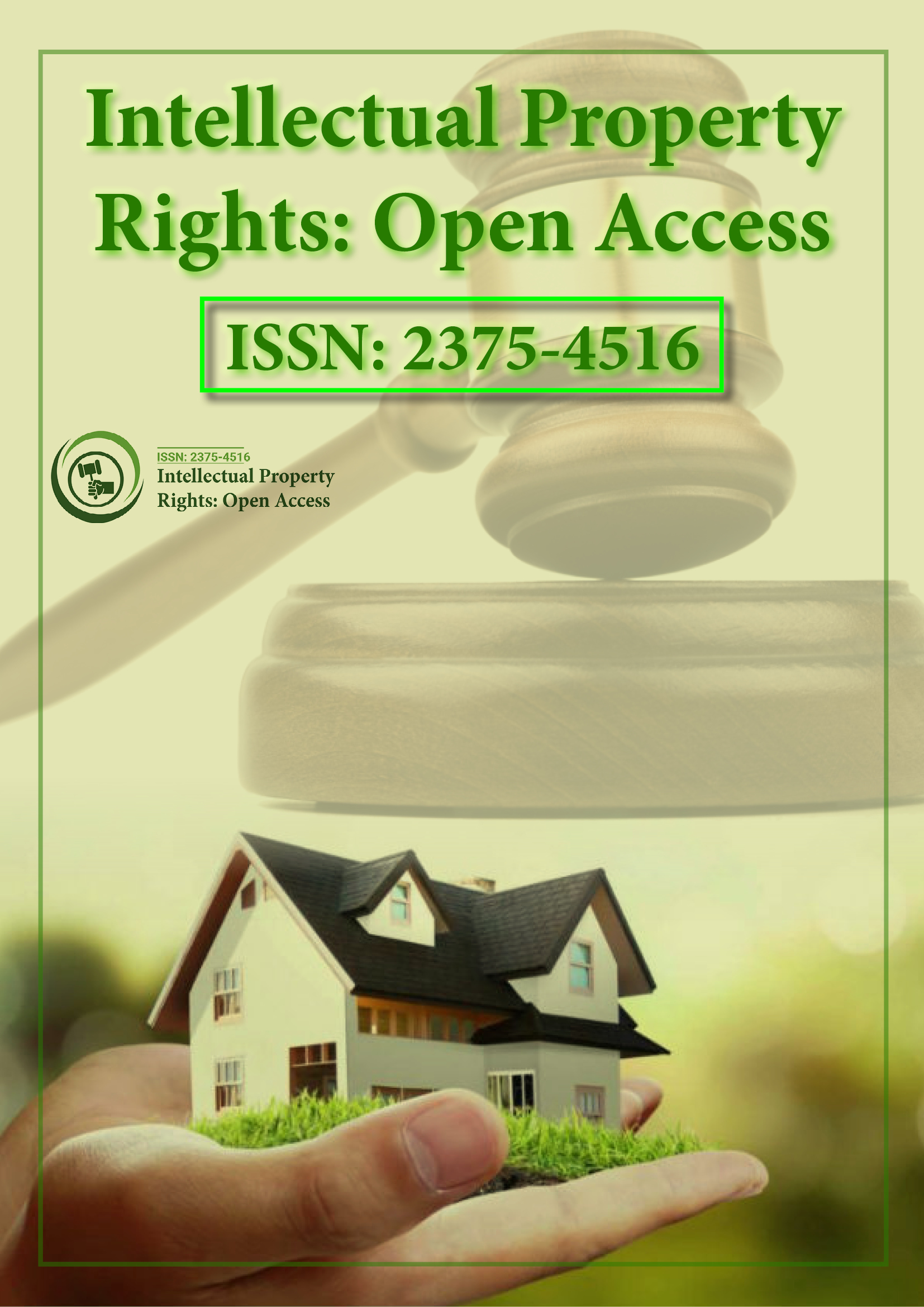Indexed In
- Open J Gate
- RefSeek
- Hamdard University
- EBSCO A-Z
- OCLC- WorldCat
- SWB online catalog
- Publons
Useful Links
Share This Page
Journal Flyer

Open Access Journals
- Agri and Aquaculture
- Biochemistry
- Bioinformatics & Systems Biology
- Business & Management
- Chemistry
- Clinical Sciences
- Engineering
- Food & Nutrition
- General Science
- Genetics & Molecular Biology
- Immunology & Microbiology
- Medical Sciences
- Neuroscience & Psychology
- Nursing & Health Care
- Pharmaceutical Sciences
Opinion Article - (2022) Volume 10, Issue 4
Copy Rights Law: It's Infringement and Protection
Tony Pessi*Received: 02-Nov-2022, Manuscript No. IPR-22-19485; Editor assigned: 07-Nov-2022, Pre QC No. IPR-22-19485 (PQ); Reviewed: 22-Nov-2022, QC No. IPR-22-19485; Revised: 28-Nov-2022, Manuscript No. IPR-22-19485 (R); Published: 06-Dec-2022, DOI: 10.35248/2375-4516.22.12.215
Description
It turns out that our legislature has never actually written a copyright law. As we indicated above, the Constitution initially provided copyright with the express intent of advancing the arts and sciences. Additionally, the term "copyright" made sense back then. The concept was that a writer or scientist would need to be assured of a way to make a profit before they would agree to publish their work. Physical copies of books were a desirable item because printing presses were difficult to come by. Authors were thus granted the sole right to produce and disseminate copies of their works.
Unfortunately, as new mediums like radio, phonographs, and television gained popularity, the original definition of copyright was no longer entirely applicable. Instead of attempting to come up with a solution on its own, Congress gathered the various "stakeholders," or authors and publishers with vested interests in copyright, into a room and told them to stay there until they had reached an agreement they could all live with. This technique of enacting laws must have been popular with Congress, although it has some significant drawbacks. For starters, individuals who were actually present for the negotiations would be the only ones to profit from the final law. Each party involved in the discussions creates highly specific, completely self-serving exclusions inside the larger statute. A law that has only been written with present industries in mind will be the end consequence. When a new industry eventually takes off, it will have significant obstacles to go past. We should also take into account that the crucial question has been altered: Is this a legislation that present stakeholders can live with, rather than "Is this a good law?" The results are catastrophic.
It is well known that current copyright laws need to be modified and developed, among other things, for hyperlinking purposes. It results from the perception that some current copyright laws are out-of-date when viewed through the lens of new technologies.
Most importantly, while occasionally warranted, the copyright law does not always seem to apply to hyperlinking. Therefore, hyperlinking complies with copyright law in theory. A new technology led to the creation of copyright law, which has since evolved and changed to accommodate new discoveries. The advent of print served as the catalyst for a trend that has continued for decades: any significant new technological advancement eventually requires some form of legal adaptation. That was the past of copyright. The intriguing situation with copyright law nowadays is that technology is further advanced than the law. An environment that does not adequately safeguard copyrights has resulted from legal advancements, technological changes that have an impact on copyright law, and reactionary measures used by some holders. Simple solutions, on the other hand, are thought to be overreactive. As a result, copyright infringement is sometimes no longer seen as a detestable act in society. However, the fundamental intent behind copyright laws still holds true today to inspire intelligent people to create valuable works for society.
Safeguarding copy rights
Access to content on the web can be restricted in a number of ways. However, anyone can build a link to a web page that anyone can thereafter follow as long as access to it is not otherwise limited. When a user clicks on a link, the contents of the destination page are replicated at least in the random-access memory of the data terminal device that he is using, and maybe in the caches of proxy servers that are used to transmit requests and responses.
However, such brief actions of reproduction are normally exempt from the exclusive rights of the right holder in accordance with Article 5(1) of the Information Society Directive 2001/29. In contrast, there is no authoritative position in the law regarding the subject of whether acts of link creation are relevant in relation to copyright law.
Conclusion
The promotion of new creative endeavours and learning depends on copyright. Technology and copyright law have changed throughout time. However, notwithstanding these contemporary tendencies, copyright's original intent has not changed. If nothing changes, eventually we will only have a few new works and massive, wellknown web sites with outdated information. As a result, red flag knowledge-related legislation must be updated to meet today's copyright requirements.
The best way to use text, images, and video that haven't created is to contact the owner of the rights and ask for their consent to reproduce the content. Before posting or publishing something, it's crucial to become aware of copyright notices. However, keep in mind that just because a copyright mark is absent doesn't indicate the content is in the public domain.
Citation: Pessi T (2022) Copy Rights Law: It's Infringement and Protection. Intel Prop Rights. 12:215.
Copyright: © 2022 Pessi T. This is an open-access article distributed under the terms of the Creative Commons Attribution License, which permits unrestricted use, distribution, and reproduction in any medium, provided the original author and source are credited.
